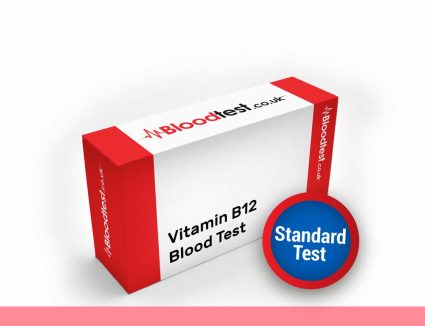The Crucial Role of Vitamin B12 Blood Testing for Your Health
The vitamin B12 blood test in Worthing is a vital procedure that significantly impacts your overall health assessment. This test is essential for identifying deficiencies that could lead to serious health complications. Scientifically known as cobalamin, vitamin B12 is indispensable for maintaining nerve function, red blood cell production, and DNA synthesis. By measuring your vitamin B12 levels through a blood test, healthcare professionals can diagnose potential deficiencies early on, enabling timely intervention and effective treatment strategies that restore your health and vitality.
Uncovering the Reasons for a Vitamin B12 Blood Test

The significance of the vitamin B12 blood test in Worthing cannot be overstated, especially for individuals who exhibit symptoms of deficiency. This test provides critical insights into your body's vitamin B12 levels, allowing healthcare providers to determine if they fall within a healthy range or indicate a deficiency. Conditions such as anaemia and various neurological disorders, including cognitive decline and nerve damage, can result from a deficiency. Therefore, this test is more than just a routine evaluation; it serves as a powerful diagnostic tool that can reveal hidden health issues and guide the necessary therapeutic actions.
Common symptoms that may prompt individuals to seek this test include unrelenting fatigue, muscle weakness, mood swings, and neurological symptoms like tingling or numbness in the extremities. As these symptoms can arise from numerous health conditions, pinpointing a vitamin B12 deficiency through a blood test can provide clarity and direction for effective treatment. If you frequently feel exhausted or are troubled by other concerning symptoms, opting for this straightforward yet informative test is a prudent choice.
Determining Who Should Get a Vitamin B12 Blood Test
The vitamin B12 blood test in Worthing is particularly recommended for individuals displaying signs of deficiency. Those who experience symptoms like extreme fatigue, weakness, or any neurological complications may find significant benefits from this important assessment. Additionally, certain demographic groups such as the elderly, vegetarians, and individuals with conditions that impair nutrient absorption—like Crohn’s disease or coeliac disease—are at a heightened risk for developing vitamin B12 deficiency.
Routine testing is advisable for those with a history of gastrointestinal surgery or individuals on long-term medications that could interfere with nutrient absorption. Furthermore, this test is indispensable for vegetarians and vegans, as their diets often lack adequate sources of vitamin B12, which is predominantly found in animal-derived products. Engaging in an open discussion with your healthcare provider regarding your symptoms and dietary habits is crucial to determine whether this test is appropriate for you. Gaining insight into your vitamin levels can lead to significant health improvements, potentially alleviating symptoms and enhancing your overall well-being.
Prefer an Audio Explanation Instead?
 Understanding the Procedure for the Vitamin B12 Blood Test
Understanding the Procedure for the Vitamin B12 Blood Test
The process for the vitamin B12 blood test in Worthing is straightforward, quick, and minimally invasive, making it a convenient option for health assessments. During the procedure, a healthcare professional will collect a small blood sample, typically drawn from a vein located in your arm. This process is generally quick and efficient, taking less than five minutes to complete. Once the sample is obtained, it is promptly sent to a laboratory for analysis, where the concentration of vitamin B12 in your blood will be measured, thereby providing essential information about your health status.
Typically, no elaborate preparations are necessary before taking this test; however, there are instances where fasting may be recommended. It's always best to consult your healthcare provider for specific instructions tailored to your individual circumstances. After the blood draw, you can resume your normal activities without any restrictions, and results are usually available within a few days. This promptness allows for timely follow-up and necessary treatments should your levels indicate a deficiency, making it a proactive and effective step towards enhancing your health.
The importance of this test cannot be overstated, as it serves as a definitive measure of your vitamin B12 status, paving the way for a comprehensive understanding and management of your health and well-being.
Finding a Convenient Venue for Your Vitamin B12 Blood Test in Worthing

Locating a facility that provides the vitamin B12 blood test in Worthing is essential for anyone seeking to proactively assess their health. Fortunately, Worthing boasts a variety of venues offering this test, catering to diverse preferences and requirements. Whether you favour a hospital, a private clinic, or a pharmacy, there are numerous options available to suit your needs and ensure convenient access to necessary health services.
Discovering Local Hospitals for Your Vitamin B12 Blood Test
In Worthing, Worthing Hospital serves as the primary venue for medical tests, including the vitamin B12 blood test. This facility is well-equipped to handle a broad spectrum of medical assessments, and patients can expect a comprehensive approach to their health concerns. The hospital adheres to strict standards of care, ensuring accurate and timely results that are crucial for effective health management.
Patients can generally anticipate a straightforward process: following a consultation with a healthcare provider, they will receive a referral for the test, ensuring that all relevant health factors are taken into account. The hospital represents a reliable option, especially for those experiencing more complex health issues that warrant a thorough medical evaluation, thereby ensuring a complete understanding of their health status.
Private Clinics in Worthing for Rapid Testing Solutions
For individuals seeking quicker results, several private clinics in Worthing offer the vitamin B12 blood test. These clinics often provide a more personalised experience, characterised by shorter wait times and flexible appointment options. Many individuals choose private clinics due to their efficient service, often receiving results within 24 hours, which can be crucial for timely health decisions.
Facilities like Worthing Health Centre and other private healthcare establishments ensure that patients receive quality care without the lengthy wait times typical of public hospitals. Their services often include comprehensive consultations, allowing individuals to discuss their symptoms and health concerns in detail prior to testing, resulting in a tailored healthcare experience that meets their specific needs.
Getting Tested at Local GP Surgeries
Numerous general practitioners (GPs) in Worthing can facilitate the vitamin B12 blood test. If you are experiencing symptoms indicative of a deficiency, your GP will evaluate your health history and may recommend this test as an integral part of your overall assessment. This option benefits patients by providing continuity of care, as your GP can interpret the results and propose an appropriate treatment plan based on your individual medical history.
Additionally, engaging with your GP ensures that any underlying health issues are comprehensively addressed, leading to a more holistic approach to managing your health. This personalised care fosters a better understanding of your nutrient needs and overall health strategy, which is essential for achieving optimal well-being.
Convenient Vitamin B12 Testing at Pharmacies
Conveniently, some pharmacies in Worthing now offer the vitamin B12 blood test. These pharmacies provide a hassle-free, walk-in service, enabling individuals to access testing without the need for a prior appointment. Many community pharmacies have recognised the rising demand for such health services and have tailored their offerings accordingly, enhancing accessibility to health assessments.
This option is particularly ideal for those with busy schedules who may find it challenging to fit in a hospital or GP appointment. The staff at these pharmacies are trained to conduct the test efficiently, providing immediate support and guidance regarding the necessary next steps if results indicate a deficiency. This makes it a practical choice for numerous individuals seeking timely health insights.
Utilising Mobile Testing Services for Vitamin B12 Assessment
In our fast-paced society, mobile health services are becoming increasingly popular, and Worthing is no exception. Several mobile health services offer the convenience of conducting the vitamin B12 blood test in the comfort of your home or workplace. This innovative approach caters to those who prefer the ease of their environment or have mobility issues that make travel challenging.
Mobile testing services provide a convenient and private option, enabling individuals to access healthcare without the stress associated with visiting a clinic or hospital. After the sample is collected, results are typically shared through secure digital platforms, ensuring privacy and ease of access, which enhances the overall experience for patients seeking to monitor their health effectively.
Key Preparations for Your Vitamin B12 Blood Test
Proper preparation for the vitamin B12 blood test in Worthing is essential for enhancing the accuracy and reliability of your results. While the procedure is relatively straightforward, understanding what to expect can alleviate any anxiety surrounding the test and ensure you are adequately prepared.
Important Steps to Take Before Your Test
Most individuals do not require any special preparation before undergoing the vitamin B12 blood test. However, it is always prudent to consult your healthcare provider for personalised instructions based on your unique circumstances. In some cases, fasting may be advised, especially if additional tests are being conducted simultaneously, which helps to ensure that all results accurately reflect your health status.
Fasting typically involves refraining from eating or drinking anything except water for a specified period before the test. It is crucial to clarify this aspect with your healthcare provider to ensure the accuracy of results. If you are currently taking any medications or supplements, it is important to inform your doctor, as certain substances can influence vitamin levels, potentially affecting test outcomes and leading to misinterpretations.
What to Anticipate During the Blood Test
The actual process of the vitamin B12 blood test in Worthing is quick and relatively painless. A healthcare professional will draw blood from a vein in your arm using a sterile needle. The procedure typically takes just a few minutes, and the discomfort experienced is minimal—often likened to a slight pinch—making the experience manageable for most individuals.
After the sample is collected, it is labelled and sent to a laboratory for analysis. The healthcare provider will ensure that you are comfortable throughout the process, addressing any questions or concerns you may have, providing reassurance and clarity to help ease any apprehensions you might feel.
What to Expect After Your Test
Once the vitamin B12 blood test has been completed, you are free to return to your normal activities immediately. Generally, there are no side effects or restrictions following the test, allowing you to continue with your day uninterrupted. Results typically become available within a few days, and your healthcare provider will reach out to discuss the findings and any necessary follow-up actions.
If you feel anxious while awaiting results, remember that this test is a straightforward step towards gaining a better understanding of your health. It opens up opportunities for treatment and interventions that can greatly enhance your quality of life and overall health outcomes.
Understanding Your Test Results
When your results arrive, interpreting them is crucial for grasping your health status. Your healthcare provider will explain the outcomes, specifying your vitamin B12 levels and whether they fall within the normal range. Normal levels typically range from 200 to 900 picograms per millilitre; however, it is essential to recognise that variations can occur based on individual circumstances, laboratory standards, and other factors.
Should your results indicate low vitamin B12 levels, your healthcare provider will discuss potential next steps, which may include dietary adjustments, supplements, or further testing to uncover the underlying cause of the deficiency. Understanding your results empowers you to take control of your health journey and make informed decisions regarding your well-being and lifestyle choices.
Decoding Your Vitamin B12 Test Results
Navigating the interpretation of your vitamin B12 blood test in Worthing results can seem intimidating; however, familiarising yourself with the normal ranges and implications of your levels is beneficial for your understanding and overall health management.
Identifying Normal Vitamin B12 Levels
Normal vitamin B12 levels are generally regarded as being between 200 and 900 picograms per millilitre. Nevertheless, it is important to note that reference ranges may slightly differ among laboratories. Your healthcare provider will clarify the specifics based on the lab’s analysis, ensuring you receive accurate information tailored to your results.
If your levels fall within this range, it typically indicates adequate vitamin B12 status, significantly reducing the likelihood of deficiency-related complications. Maintaining healthy vitamin B12 levels is crucial for numerous bodily functions, including neurological health and the production of red blood cells, both of which are fundamental for overall well-being.
Understanding the Consequences of Low Vitamin B12 Levels
Low vitamin B12 levels can signify potential deficiencies that may lead to serious health complications, including pernicious anaemia, cognitive decline, and various neurological issues. If your results indicate low levels, it is essential to consult your GP in Worthing for a thorough evaluation of your health status and potential treatment options.
Symptoms of deficiency may encompass fatigue, weakness, mood disturbances, and neurological symptoms such as tingling or numbness in the hands and feet. Recognising the seriousness of low vitamin B12 levels is vital; timely intervention can prevent long-term complications and enhance your quality of life, making it imperative to address any deficiencies without delay.
When to Consult Your Doctor
If your vitamin B12 blood test results are abnormal, it is crucial to seek further evaluation from your GP in Worthing. Your doctor will consider your results alongside your medical history, symptoms, and lifestyle factors to develop a personalised treatment strategy tailored to your specific needs.
Consultation is particularly critical if you are experiencing symptoms consistent with deficiency. Timely intervention and appropriate treatment can dramatically improve your health and prevent potential long-term consequences, ensuring you maintain optimal health and well-being.
Factors Affecting Vitamin B12 Levels
Several factors can influence your vitamin B12 levels, leading to variations in test results. Dietary habits play a significant role, especially for those following vegetarian or vegan diets, as animal products are the primary source of vitamin B12. For individuals who do not consume these foods, obtaining sufficient amounts of this essential vitamin can be challenging.
Age can also impact absorption; as individuals age, the body's ability to absorb nutrients may diminish. Certain medical conditions, such as gastrointestinal disorders, can further impair nutrient absorption. Additionally, medications, particularly those that reduce stomach acid, can interfere with vitamin B12 absorption, leading to potential deficiencies if not closely monitored.
Understanding these factors is crucial, as they can inform necessary adjustments in dietary intake, supplementation, or additional medical evaluations to effectively address any underlying issues and maintain optimal health.
Effective Strategies for Enhancing Your Vitamin B12 Levels
To improve your vitamin B12 levels, consider making dietary adjustments. Incorporating vitamin B12-rich foods into your meals can significantly enhance your levels. Foods such as meat, fish, eggs, and dairy are excellent sources of this essential vitamin, providing the necessary nutrients for overall health.
For individuals who struggle to obtain adequate vitamin B12 from their diet, supplements may serve as a beneficial option. Your healthcare provider in Worthing can recommend the appropriate type and dosage based on your specific needs and health status. In more severe cases, vitamin B12 injections may be necessary for rapid results, particularly if absorption issues are suspected, as they provide a direct method for quickly replenishing levels.
Additionally, consuming fortified foods—such as certain cereals and plant-based milks—can be a good strategy for vegetarians and vegans to ensure adequate intake. Nasal sprays represent another innovative option for those who may have difficulty with oral supplements or injections. This alternative delivery method can be particularly effective, as it ensures direct absorption of vitamin B12 into the bloodstream, facilitating improved health outcomes.
Comprehensive Treatment Options for Vitamin B12 Deficiency
Promptly addressing a vitamin B12 deficiency is crucial for maintaining your overall health. The treatment options available for managing this deficiency are diverse and can be tailored to meet individual needs, ensuring effective restoration of vitamin levels.
Making Dietary Adjustments for Optimal Health
One of the first steps in addressing a vitamin B12 deficiency is to consider dietary changes. Increasing the intake of vitamin B12-rich foods can significantly impact levels. Sources such as lean meats, fish, poultry, eggs, and dairy products provide high amounts of this essential nutrient, supporting overall health and energy levels.
For vegetarians and vegans, alternative sources such as fortified foods and supplements are crucial. Options like fortified cereals, plant-based milks, and nutritional yeast should be regularly included in their diet. Incorporating these foods can help bolster your vitamin B12 levels and alleviate deficiency symptoms, leading to improved health outcomes and a better quality of life.
Maintaining a balanced diet that includes healthy fats, carbohydrates, and proteins, along with foods rich in vitamin B12, will contribute to optimal health and energy levels. Consulting with a nutritionist can provide additional guidance on how to effectively adjust your diet to meet your nutritional needs and preferences, ensuring comprehensive health management.
Utilising Vitamin B12 Supplements for Effective Restoration
In cases of moderate to severe deficiency, healthcare providers in Worthing may prescribe vitamin B12 supplements. These can be in the form of oral tablets or sublingual forms that dissolve under the tongue for improved absorption. This method is utilised to ensure that individuals receive adequate amounts of the vitamin to correct deficiencies effectively.
For individuals who struggle to maintain sufficient levels through diet alone, supplements can provide an effective solution. The dosage will vary based on the severity of the deficiency and individual health factors, allowing for personalised treatment plans. Regular follow-up appointments will ensure that your levels are being monitored, and adjustments can be made as needed to optimise health outcomes.
In some cases, vitamin B12 injections may be recommended. This method is particularly effective for individuals with absorption issues, as it bypasses the digestive system, providing immediate results. Your healthcare provider will determine the most appropriate treatment plan based on your specific circumstances, ensuring the most effective approach to restoring your vitamin levels.
The Importance of Monitoring and Follow-Up Care
Regular monitoring is crucial for those undergoing treatment for vitamin B12 deficiency. Follow-up tests are essential for evaluating the effectiveness of dietary changes, supplements, or injections. Typically, healthcare providers will recommend retesting your vitamin B12 levels after a few months of treatment to ensure that they are improving and to make any necessary adjustments to your treatment plan.
Maintaining ongoing communication with your healthcare provider is vital during this process. They will guide you through any necessary adjustments based on your results and overall health condition, helping you establish a routine for check-ups that will assist in maintaining optimal vitamin B12 levels and preventing potential complications in the future.
Incorporating Fortified Foods into Your Daily Diet
For individuals at risk of deficiency, particularly vegetarians and vegans, incorporating fortified foods into their diet can be a proactive approach. Many plant-based products, such as fortified cereals, plant-based milks, and meat substitutes, contain added vitamin B12, making it easier to meet daily requirements for this essential nutrient.
When selecting fortified foods, it is crucial to check labels for vitamin B12 content. These products can be a valuable addition to your diet, helping to bridge the gap for those who do not consume animal products. Regular consumption of fortified foods can significantly enhance your vitamin B12 levels, reducing the risk of deficiency while supporting overall health.
Utilising Nasal Sprays for Effective Vitamin B12 Delivery
Vitamin B12 nasal sprays represent an alternative delivery method for individuals who may struggle with oral supplements or injections. This form of treatment enables the rapid absorption of vitamin B12 directly into the bloodstream through the nasal mucosa, facilitating swift and effective restoration of vitamin B12 levels.
For those who find injections cumbersome or unappealing, nasal sprays offer a convenient option. They are simple to use and can be administered at home, providing a hassle-free way to manage vitamin B12 levels effectively. Consulting with your healthcare provider can help determine whether this option is suitable for your specific circumstances, ensuring that you receive the best possible care tailored to your needs.
Identifying Common Symptoms of Vitamin B12 Deficiency
Recognising the symptoms of a vitamin B12 deficiency is essential for timely intervention and effective treatment. This deficiency can manifest through a range of signs, encompassing both physical and neurological symptoms that should not be overlooked.
Spotting Fatigue and Weakness
One of the most prevalent signs of a vitamin B12 deficiency is fatigue or weakness. Given that vitamin B12 plays a critical role in the production of red blood cells, low levels can lead to anaemia, resulting in inadequate oxygen delivery to the body’s organs. This can leave individuals feeling persistently exhausted and drained, hindering their ability to perform daily activities effectively and detrimentally impacting overall quality of life.
Individuals experiencing unexplained fatigue should consider discussing the possibility of a vitamin B12 deficiency with their healthcare provider. By obtaining a vitamin B12 blood test in Worthing, they can gain valuable insights into their health status and explore appropriate treatment options, paving the way for improved energy levels and vitality.
Recognising Neurological Symptoms Related to Deficiency
Beyond fatigue, neurological symptoms can also arise from a vitamin B12 deficiency. Common indicators include numbness and tingling in the hands and feet, as this vitamin is essential for maintaining healthy nerve function and overall neurological health.
Additionally, memory problems and cognitive decline can manifest, particularly among older adults. If you notice changes in your cognitive abilities or experience unusual sensations in your extremities, it’s crucial to consult your GP in Worthing for a thorough assessment. Early intervention is essential to minimise potential long-term effects on your health and to ensure that any deficiencies are addressed promptly and effectively.
Understanding Mood Disturbances Linked to Vitamin B12 Levels
Mood disturbances, including irritability and depression, may also indicate low vitamin B12 levels. The vitamin plays a significant role in synthesising neurotransmitters that affect mood and cognition, making it a vital factor in mental health.
If you’re experiencing unexplained mood changes alongside other symptoms, such as fatigue or neurological issues, seeking a vitamin B12 blood test can provide essential information regarding your health. Understanding the underlying causes of these changes can lead to more effective management of your overall well-being, enhancing both mental and physical health.
Identifying Oral Symptoms: Glossitis and Mouth Ulcers
Unusual changes in the mouth, such as glossitis (characterised by a swollen, inflamed, and smooth tongue) and mouth ulcers, can also signal a vitamin B12 deficiency. These symptoms may sometimes accompany other gastrointestinal issues, making it essential to seek a comprehensive evaluation from a healthcare provider.
Recognising these signs is crucial, as they can help identify a deficiency before it leads to more severe health complications. If you notice such changes, consult your healthcare provider to discuss your symptoms and the possibility of undergoing a vitamin B12 blood test in Worthing, which can facilitate timely intervention and care.
Commonly Asked Questions about Vitamin B12 Deficiency
What is the typical normal range for vitamin B12 levels?
Normal vitamin B12 levels typically range from 200 to 900 picograms per millilitre, though this can vary slightly depending on the laboratory conducting the test. Your healthcare provider can clarify the specific range used in your test, ensuring you receive accurate information regarding your health status.
How frequently should I undergo testing for vitamin B12 deficiency?
The frequency of testing depends on individual risk factors and the presence of symptoms. Those with dietary restrictions, medical conditions, or a history of previous deficiencies should consult their GP for tailored recommendations, allowing for a personalised approach to health monitoring.
Can I obtain vitamin B12 from a vegan diet?
Yes, it is possible to obtain vitamin B12 from a vegan diet, but careful planning is required. Vegans can gain vitamin B12 from fortified foods, such as cereals and plant-based milks, or through supplements, ensuring they avoid deficiency while maintaining their dietary preferences.
What common symptoms indicate a vitamin B12 deficiency?
Common symptoms of vitamin B12 deficiency include fatigue, weakness, neurological symptoms like numbness, mood changes, and mouth ulcers. If you experience these symptoms, it is essential to consult your healthcare provider for a thorough assessment, allowing for timely intervention and care.
Is it safe to take vitamin B12 supplements?
Vitamin B12 supplements are generally safe and well-tolerated. However, it is advisable to consult your healthcare provider for appropriate dosages based on your individual health needs and circumstances, ensuring you receive the best possible care.
How can I effectively improve my vitamin B12 levels?
You can improve your vitamin B12 levels through dietary changes, such as increasing your intake of vitamin B12-rich foods, or by taking supplements as advised by your healthcare provider, ensuring a comprehensive approach to your nutrient needs.
What tests are typically performed to determine vitamin B12 deficiency?
The primary test for assessing vitamin B12 deficiency is a blood test measuring vitamin B12 levels. Additional tests may include measuring homocysteine and methylmalonic acid levels to provide further insight into your health status and nutrient absorption.
How long does it take to see improvement after starting treatment?
Improvement can vary based on the severity of the deficiency and the treatment method employed. Many individuals notice improvements within weeks of making dietary changes or starting supplements, leading to enhanced energy levels and overall well-being.
Can I have a vitamin B12 deficiency without exhibiting symptoms?
Yes, some individuals can have low vitamin B12 levels without experiencing noticeable symptoms. Regular testing is essential, especially for those at risk, to ensure that any potential issues are identified and addressed promptly.
Should I consult my doctor before starting vitamin B12 supplements?
Yes, consulting your GP is crucial to ensure that supplements are suitable for your specific situation and to discuss any potential interactions with other medications or health conditions, thereby ensuring comprehensive and safe health management.


